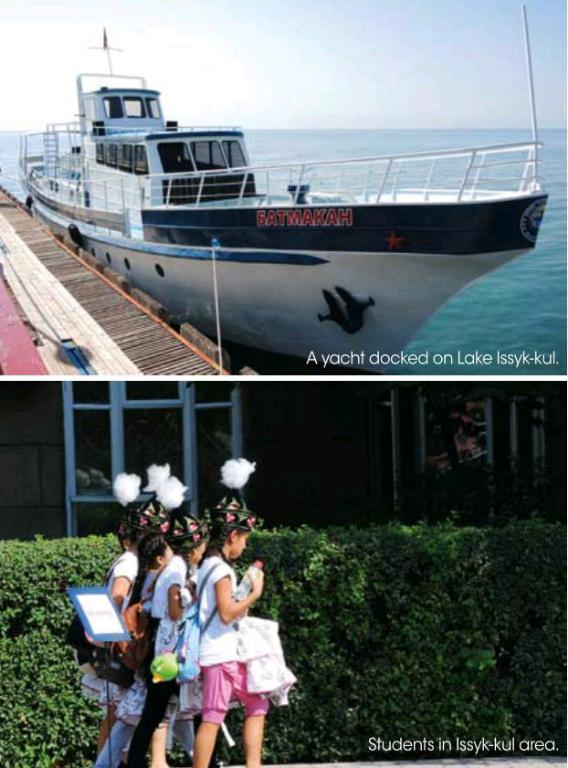Reflection of Lake Issyk-kul
2014-03-28byChuJiwang
by+Chu+Jiwang
In September 2013, following the honor of joining a delegation traveling with President Xi Jinping to the Conference on the Establishment of the Sino-Kazakhstan Entrepreneurs Committee in Astana, the capital of Kazakhstan, I joined several other Chinese entrepreneurs in setting off from Alma-Ata to Bishkek, the capital of Kyrghyzstan, to attend a meeting of the Business Council of the Shanghai Cooperation Organization(SCO), held lakeside of Issyk-kul.
On our way to the lake by bus rolling through ravines and across deserts, we saw no shadows of birds or animals and only the desolation of the great wilderness.“What pitiful land,” some complained.“Nature is fair,” another argued. “It has abundant untouched reserves of gold, coal, petroleum, and natural gas. If it was developed, it would become a busy metropolis.”
We finally arrived at the lake after a 16-hour drive. The world was totally different. Seeing nothing but a vast expanse of desert for 300 kilometers, we were stunned by almost everything along the lake feeding our eyes – every blade of grass, fresh and alive, every little flower bud, and a pool of crystal water – full of vigor and vitality, not to mention the surface of the worlds second largest alpine lake.
The lake became especially charming after our tour guide recounted a legend. There were no residents prior to a foreign invasion. After fleeing their homes, the Kirghizs saw the beautiful scenery of Issyk-kul and the fear and panic caused by invasion melted. They took off their clothes and threw themselves into the lake,enjoying the gift nature bestowed, and the pursuing forces arrived. Also astonished by the beauty of the lake, the soldiers were suddenly softened by the people bathing in the lake: “War is nothing but a sin,” they realized. “Massacre is brutal.” With that, a village shared by settlers and soldiers was established, where they lived contentedly together for centuries.
That legend isnt alone. The most popular, perhaps, alleges that Genghis Khan was buried under the lake in a sarcophagus along with six other coffins filled with priceless treasure. No physical evidence has lent credibility to the tale, but it has still attracted numerous treasure hunters and archaeologists.
Another story claims that Tokmok, a city on the northwest of the lake, is the birthplace of Li Bai, an eminent Chinese poet of the Tang Dynasty (618-907).
We stayed at Avrora Sanatorium, a villa block built during the Soviet period along the shore. Early the next day, I took a stroll alone along Issyk-kul, enjoying the tranquility of the lake. My heart calmed with the boundlessness of the blue water. I had never felt so peaceful after enduring years of fierce business competition. I found the joy of peace from the gloom, saw a sea of brightness, and felt vigor of youth emerging from pessimism.
My trance was deepened by the breeze, which led me to a fancy world with bouncing green silk and sparkling pearls scattered across the mirror of the lake… I was standing in the middle of nowhere – like wind blowing over the lake of Issyk-kul, pondering my own existence.
